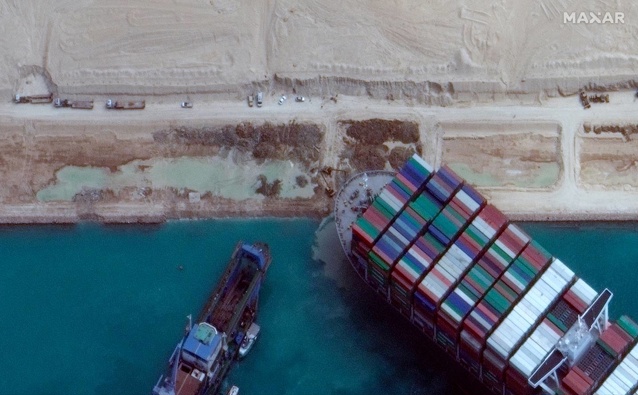Follow
the podcast on

Two additional tugboats have embarked to Egypt's Suez Canal to aid efforts to free a skyscraper-sized container ship wedged across the crucial waterway, even as major shippers increasingly divert their boats out of fear the vessel may take even longer to free.
The massive Ever Given, a Panama-flagged, Japanese-owned ship that carries cargo between Asia and Europe, got stuck on Tuesday in a single-lane stretch of the canal. In the time since, authorities have been unable to remove the vessel and traffic through the canal — valued at over $9 billion a day — has been halted, further disrupting a global shipping network already strained by the coronavirus pandemic.
The Dutch-flagged Alp Guard and the Italian-flagged Carlo Magno, called in to help tugboats already there, reached the Red Sea near the city of Suez early Sunday, satellite data from MarineTraffic.com showed. The tugboats will nudge the 400m-long (quarter-mile-long) Ever Given as dredgers continue to vacuum up sand from underneath the vessel and mud caked to its port side, said Bernhard Schulte Shipmanagement, which manages the Ever Given.
On Sunday, excavators dug on the eastern wall of the Suez Canal, hoping to free the bulbous bow of the Ever Given that plowed into the embankment, satellite photos showed.
/cloudfront-ap-southeast-2.images.arcpublishing.com/nzme/MZEI7JBALXT34YUYAKDUJLBKQM.jpg) A snapshot of ships waiting off the entrance to the Suez Canal, early Monday morning New Zealand time. Screengrab / Marinetraffic.com
A snapshot of ships waiting off the entrance to the Suez Canal, early Monday morning New Zealand time. Screengrab / Marinetraffic.com
The next high tide at 11.30pm local time - about 10.30am New Zealand time - coincides with a full moon and is expected to provide the best conditions yet to free the Ever Given.
The BBC reported the tugboats had so far managed to move the ship "30 degrees from left and right", moving the vessel about 30m and footage posted on Twitter appeared to show the tugboats honking their horns to celebrate this small victory.
Workers planned to make two attempts to free the vessel on Sunday night, a top pilot with the canal authority said. The full moon offers a spring tide, or king tide, in which high tides are higher and the low tides are lower because of the effects of gravity during a straight-line alignment of the Earth, the moon and the sun.
"Sunday is very critical," the pilot said. "It will determine the next step, which highly likely involves at least the partial offloading of the vessel."
Local media declared further speculation that the effort was making headway.
Two Suez Canal Authority sources told Reuters that a mass of rock had been found at the bow of the ship, complicating salvage efforts and diverting attention to efforts to lighten the load on the stricken vessel.
Taking containers off the ship likely would add even more days to the canal's closure, something authorities have been desperately trying to avoid. It also would require a crane and other equipment that have yet to arrive.
The pilot spoke to The Associated Press on condition of anonymity as he wasn't authorised to brief journalists.
On Saturday, the head of the Suez Canal Authority told journalists that strong winds were "not the only cause" for the Ever Given running aground, appearing to push back against conflicting assessments offered by others. Lt Gen Osama Rabei said an investigation was ongoing but did not rule out human or technical error.
Bernhard Schulte Shipmanagement maintains that "initial investigations rule out any mechanical or engine failure as a cause of the grounding". However, at least one initial report suggested a "blackout" struck the hulking vessel carrying some 20,000 containers at the time of the incident.
Rabei said he remained hopeful that dredging could free the ship without having to resort to removing its cargo, but added that "we are in a difficult situation, it's a bad incident".
Asked about when they expected to free the vessel and reopen the canal, he said: "I can't say because I do not know."
Speaking on Sunday to the pro-government Egyptian television channel Extra News, Rabei said Egyptian President Abdel Fattah el-Sissi had ordered the canal authority to prepare for all options, including taking containers off of the vessel. He said officials had been in talks with the US about that possibility, without elaborating.
Shoei Kisen Kaisha Ltd, the company that owns the vessel, said it was considering removing containers if other refloating efforts failed.
The Ever Given is wedged about 6km north of the canal's Red Sea entrance near the city of Suez.
A prolonged closure of the crucial waterway would cause delays in the global shipment chain. Some 19,000 vessels passed through the canal last year, according to official figures. About 10 per cent of world trade flows through the canal. The closure could affect oil and gas shipments to Europe from the Middle East. Already, Syria has begun rationing the distribution of fuel in the war-torn country amid concerns of delays of shipments arriving amid the blockage.
/cloudfront-ap-southeast-2.images.arcpublishing.com/nzme/J3FUQJFUQNNKME2LHHZWJ62ICM.jpg?width=1058&height=705&mode=max) Cargo ships idle at the Gulf of Suez as Ever Givena Panama-flagged cargo ship, is wedged across the Suez Canal and blocks traffic in the vital waterway. Photo / Mohamed Elshahed, AP
Cargo ships idle at the Gulf of Suez as Ever Givena Panama-flagged cargo ship, is wedged across the Suez Canal and blocks traffic in the vital waterway. Photo / Mohamed Elshahed, AP
As of early Sunday, over 320 ships waited to travel through the Suez, either to the Mediterranean or the Red Sea, according to canal services firm Leth Agencies. At least 10 of those vessels carried livestock, raising concerns about the animals. Rabei told the Saudi-owned satellite news channel Al-Arabiya that authorities planned to offer provisions to help them.
Dozens of others still listed their destination as the canal, though shippers increasingly appear to be avoiding the passage.
Bloomberg reports there are likely to be animals crammed into the hulls of several of the livestock ships.
Little information is available, with neither canal officials nor shipping executives willing to provide details, but data compiled by Bloomberg indicated as many as 10 vessels stuck in and around the canal could be carrying thousands of livestock. "Given the Europe-to-Saudi Arabia itinerary, they are most likely carrying sheep. Seven of the ships, headed for Jordan, have 92,000 livestock on board," the agency said.
A New Zealand animal rights organisation said the Suez situation was the latest in a series of live export crises.
"It's unforeseen circumstances like this that make live export so risky," said SAFE CEO Debra Ashton . "And it adds to our concerns for the welfare of animals in the live export trade."
"Disease, bad weather, and shipping delays can all leave animals stranded at sea."
Thousands of animals were recently stranded in the Mediterranean on board the livestock ships Elbeik and Karim Allah. Both were bound for Libya, but following an onboard outbreak of the viral disease bluetongue, they were refused entry at multiple ports. Many of those animals have now been slaughtered.
"New Zealand had its own live export crisis last year, when the Gulf Livestock 1 sunk off the coast of China," said Ashton. "It won't be the last crisis."
The world's biggest shipping company, Denmark's AP Moller-Maersk, warned its customers that it would take anywhere from three to six days to clear the backlog of vessels at the canal. Already, the firm and its partners have 27 ships waiting to enter the canal, with three stuck in the waterway itself and two more coming Sunday.
"We have until now redirected 15 vessels where we deemed the delay of sailing around the Cape of Good Hope at the southern tip of Africa equal to the current delay of sailing to Suez and queuing," the shipper said.
Mediterranean Shipping Co, the world's second-largest shipper, said it already had rerouted at least 11 ships around the Cape of Good Hope to avoid the canal. It turned back two other ships and said it expected "some missed sailings as a result of this incident".
"MSC expects this incident to have a very significant impact on the movement of containerised goods, disrupting supply chains beyond the existing challenges posed by the Covid-19 pandemic," it said.
Take your Radio, Podcasts and Music with you









